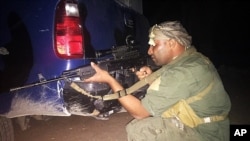Iraq experts warn that unless the United States works to have Sunni Iraqis take up arms against the Islamic State (IS) militant group, Washington’s policy of airstrikes and targeted raids will do nothing but slow the country’s collapse into crippling sectarian warfare.
Faced with a similar situation less than a decade ago, the U.S. military vetted 90,000 Sunni males to fight against al-Qaida in Iraq, the predecessor of the Islamic State group. The “surge” as it was known, pushed back al-Qaida, and for a few years it looked like Iraq could dig itself out of war.
“They were the only ones capable of doing that,” former U.S. intelligence officer and military adviser Michael Pregent said of the Sunni tribes. “Shia militias were never able to do it even while we were there with 120,000 U.S. troops. We couldn’t do it with 120,000 U.S. troops; we could only kill al-Qaida using Sunni tribes to do it.”
U.S. strategy so far has been a combination of airstrikes against IS and targeted raids by Special Forces, such as the assault in Syria last Friday night that killed a top IS finance operative known as Abu Sayyaf.
Pentagon spokesman Col. Steve Warren on Monday described the raid as a “bright spot” in the fight against the militant group.
“The operation went off exactly as planned with the exception the target was killed instead of captured when he engaged friendly forces, when he engaged U.S. forces,” Warren said Monday.
"Leadership Decapitation"
But Max Abrahms, professor of political science at Northeastern University in Massachusetts, told VOA this strategy of “leadership decapitation” was not enough to turn the tide in Syria and Iraq, where IS controls vast swaths of land.
“By taking out the senior leadership, the thinking is that we erode the quality of the numbers and with it the capability of the organization to inflict violence,” Abrahms said. “However, the actual results of leadership decapitation beyond their operational successes of killing seemingly high-value targets have been a disappointment. We have used leadership decapitation in large quantities against the Taliban, al-Qaida and the Islamic State, and each of those groups is still thriving.”
Pregent, who spent 2005-2010 in Iraq, said raids like that by the U.S. Special Forces in Syria over the weekend could yield valuable information to help defang IS.
Initially Syrian TV claimed Syrian government forces had killed a number of IS fighters, including a senior commander.
Pregent lambasted the White House for then releasing details of the assault in what he said was a short-sighted desire for a public relations victory.
“The strategy the way it’s supposed to work is that when you conduct a raid, like against a high value target, you don't announce it right away. You let ISIS announce it. You let the chatter come up on cell phones and social media. You let them tell the world that something has happened by monitoring who comes up and who says things. That generates follow-on targets,” Pregent said. “But you negate that, the intelligence community’s ability to do that, when you announce it as a PR success.”
Both Pregent and Abrahms agreed that IS has only suffered serious setbacks when it has faced capable ground forces coupled with the U.S. airstrikes, such as in the Syrian town of Kobane where Kurdish forces fought on the ground, or Tikrit in Iraq when Shia militias wanted revenge for the massacre of unarmed Iraqi military recruits in 2014.
Fall of Ramadi "Huge," Baghdad at Risk
But that coordination failed when it came to the Sunni provincial capital of Ramadi which fell to IS over the weekend – a collapse that Pregent described as “huge.”
“The Shia militias don’t really care about Ramadi. The peshmerga certainly don’t. This is a Sunni area that the Shia are not willing to go and fight and die in, and ISIS knows that, Sunni insurgents know that, the Sunni population now knows that, and this is an opportunistic environment for anti-government forces to do something about it,” Pregent said.
“There has to really be a serious look at what losing Ramadi, losing Fallujah and Abu Ghraib looks like to the security of Baghdad,” Pregent warned. He said without a Sunni-heavy force to fight the Islamic State, western Baghdad could fall to the extremists, and the capital would return to the sectarian violence levels of 2005-2006, when bodies littered the streets of the city.
Much of the current upheaval and sectarian conflict stems from successive Shia-led Iraqi governments failing to reach out and give the Sunnis a place at the country’s political and security table. Iraqi Prime Minister Haider al-Abadi had pledged to redress that imbalance, but Pregent said Abadi was still heavily reliant on Iran, which is a Shia power some analysts say is bent on keeping Sunnis out of power.
“Here’s the biggest problem: we have to spend more time with Abadi than Iran is spending time with Abadi. We get 45 minutes of his day, whereas [Iranian General Qassem] Soleimani gets six to eight hours of his day. They have more influence than we do. Iran is the problem here.”
Pregent said Washington would have to reconvene the former Sunni tribal leaders who helped defeat al-Qaida and get the Baghdad government to pledge that they would reintegrate them into the Iraqi security forces, arm them, give them ranks and give them pensions if they wanted to retake Sunni areas from the IS extremists.





